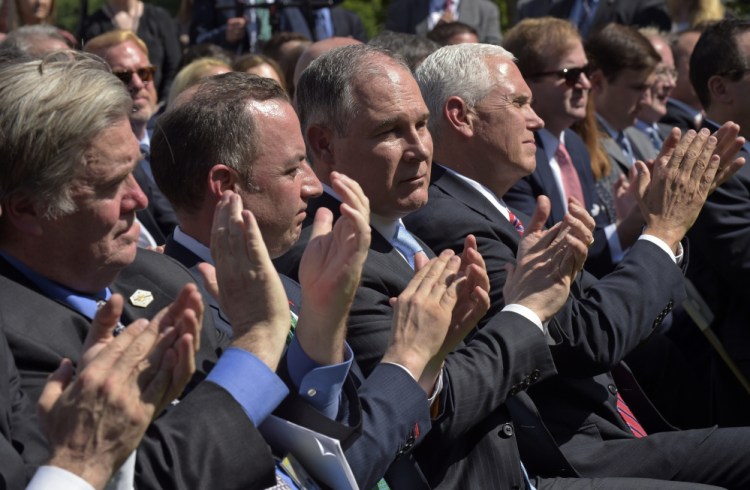WASHINGTON — President Trump railed against the Paris climate agreement in the White House Rose Garden on Thursday, but it was hard to reconcile his description of the climate accord with the real one.
“As of today, the United States will cease all implementation of the nonbinding Paris accord and the draconian financial and economic burdens the agreement imposes on our country,” Trump said – a phrase seeming to contain a logical contradiction. If the agreement is non-binding, then what burdens can it impose?
And that contradiction gets to the heart of why Trump seemed, on Thursday, not to be arguing against the Paris agreement itself, but rather, against the Obama administration’s climate pollution pledge under that agreement, under which the United States would cut its emissions by 26 percent to 28 percent below their 2005 levels by the year 2020.
But the agreement does not require a particular level of emissions cuts for a particular country; rather, the U.S. and any other nation can choose its own level of emissions reductions.
“It seems very unnecessary to have to withdraw from the Paris Agreement if the concern is focused on the U.S. emissions target and financial contributions,” said Sue Biniaz, who served at the State Department as the United States’ lead climate change lawyer from 1989 until earlier this year. “The U.S. can unilaterally change its emissions target under the Agreement – it doesn’t have to ‘renegotiate’ it – and financial contributions are voluntary.”
“If the president believes the Paris agreement is a bad deal for the U.S. because our voluntary emission commitments are more stringent than those of other large emitters, the U.S. can reduce the ambition of our domestic policies while still remaining part of the agreement rather than giving up our seat at the table and undermining U.S. leadership and credibility,” added Jason Bordoff, who heads the Center on Global Energy Policy at Columbia University.
Similarly, Trump argued that the U.S. would try to “begin negotiations to re-enter either the Paris accord or “a really entirely new transaction, on terms that are fair to the United States, its businesses, its workers, its people, its taxpayers.”
But it seems near impossible to reassemble every country in the world to start from scratch on the Paris agreement, when those countries are already busily implementing it.
“The notion that other nations would ‘renegotiate’ Paris is absurd, since they have already bent over backwards in the Paris deal to accommodate all major U.S. priorities, including voluntary emissions limits, action by developing countries, and a non-legally binding agreement,” said Paul Bledsoe, who served as a climate policy adviser in the Clinton administration and is now a lecturer at American University’s Center for Environmental Policy.
“Other countries are very unlikely to be interested in renegotiating the Paris Agreement or in negotiating an alternative agreement,” added Bob Perciasepe, president of the Center for Climate and Energy Solutions, in a statement. “But the United States still retains the right to adjust the terms of its participation in the Paris Agreement by revising its target.”
And then, there were Trump’s claims about how other countries like China and India would presumably take advantage of the Paris deal, to the U.S.’s disadvantage.
Niklas Höhne, a professor at Wageningen University in the Netherlands and a founder of the New Climate Institute, commented by email that this part of the speech, too, didn’t add up. He wrote:
“As a scientist, I was amazed by the many wrong assertions that he used. He said that China will be allowed to build hundreds of additional coal plants. This is true in principle, but China cancelled the building of new coal power plants and absolute coal use has declined in three consecutive years. He said that India may double their coal production, but also India is slowing its growth of coal use and just stated that the recent coal plants in construction may not be necessary until 2022.”
The White House also put out talking points stating that, “According to researchers at MIT, if all member nations met their obligations, the impact on the climate would be negligible. The impacts have been estimated to be likely to reduce global temperature rise by less than .2 degrees Celsius in 2100.” Trump made similar remarks in his Rose Garden speech.
But that’s not true, according to John Sterman, an MIT researcher who works to analyze climate change scenarios, and Andrew Jones, a researcher with the think tank Climate Interactive.
Their analysis shows that the current country level pledges under the Paris agreement would reduce the planet’s warming by the year 2100 down from 4.2 degrees Celsius (7.56 degrees Fahreheit) to 3.3 degrees Celsius (5.94 degrees Fahrenheit), or nearly a full degree.
And of course, that’s just the beginning – the Paris agreement is structured so that it increases the ambition of the countries that belong to it over time, always in a voluntary manner, asking each to do what it can. So over time, the agreement’s ability to reduce the warming of the planet will improve.
And that will probably still be the case – even though, for now at least, the U.S. won’t be a part of it.
Copy the Story LinkSend questions/comments to the editors.



Success. Please wait for the page to reload. If the page does not reload within 5 seconds, please refresh the page.
Enter your email and password to access comments.
Hi, to comment on stories you must . This profile is in addition to your subscription and website login.
Already have a commenting profile? .
Invalid username/password.
Please check your email to confirm and complete your registration.
Only subscribers are eligible to post comments. Please subscribe or login first for digital access. Here’s why.
Use the form below to reset your password. When you've submitted your account email, we will send an email with a reset code.